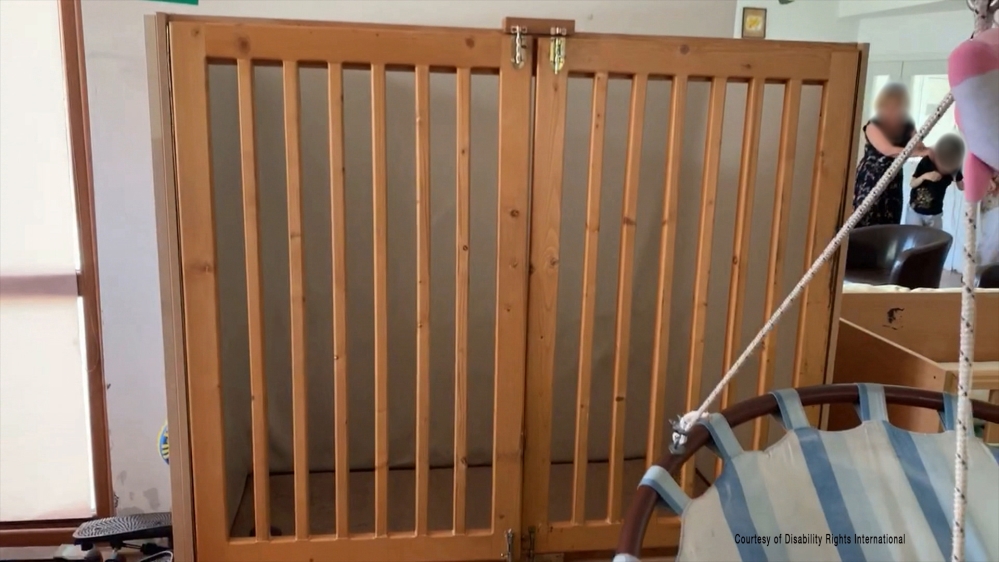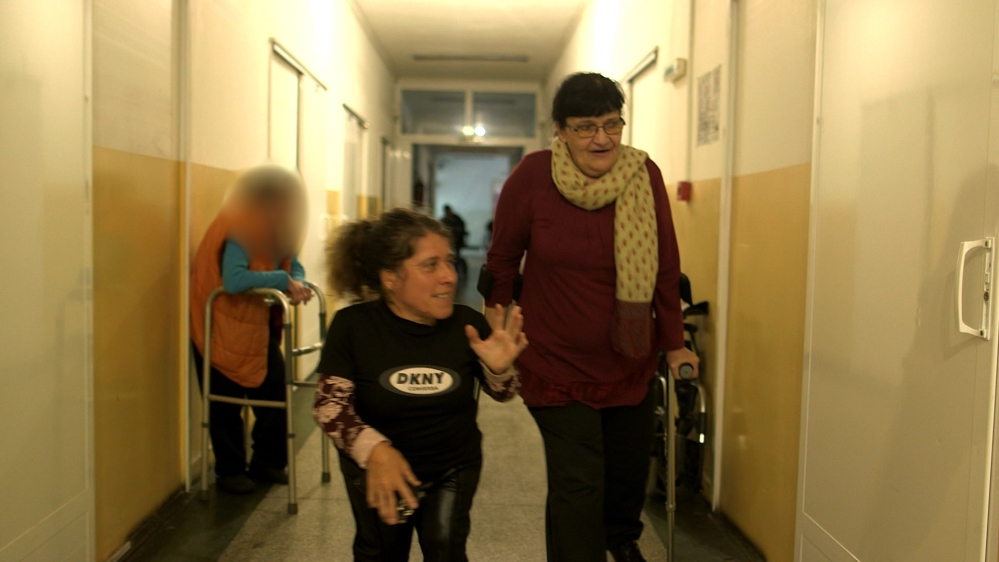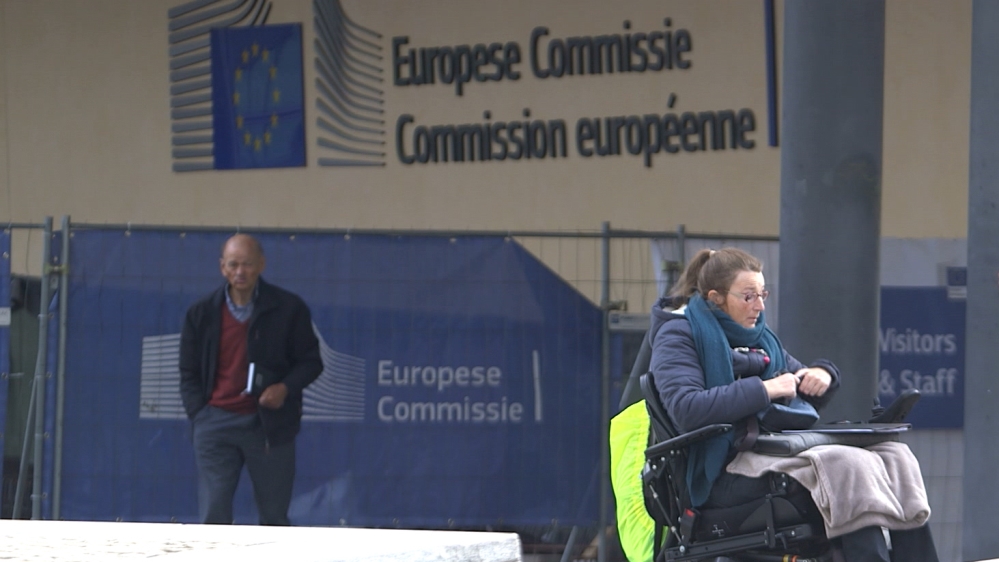
Europe’s Recurring Shame: From Bulgaria to Brussels
People & Power investigates the abuse of people with disabilities at EU-funded care homes across Eastern Europe.
In 2014, People & Power revealed the shameful treatment of people with disabilities in Romania’s state-run care homes. That film also raised disturbing questions about why the EU was funding some of those institutions.
Now, five years on, there are fresh allegations about neglect and mistreatment – this time not just in Romania, but in neighbouring countries, too.
Keep reading
list of 4 itemsPalestinian Prisoner’s Day: How many are still in Israeli detention?
‘Mama we’re dying’: Only able to hear her kids in Gaza in their final days
Europe pledges to boost aid to Sudan on unwelcome war anniversary
For the second episode of our two-part investigation, filmmakers Sarah Spiller, Callum Macrae and Mark Williams went to Bulgaria and then EU headquarters in Brussels to find out more.
|
|
FILMMAKER’S VIEW
By Sarah Spiller
It’s July 2019 and we’re in Bulgaria, a country sometimes held up as a model for tackling the appalling mistreatment of disabled children and youngsters in the past – and for closing the large state institutions in which it took place.
One part of this reform programme is the creation of what are called “small group homes”; places for up to 15 children and youngsters that – it’s said – are about family life, community living.
But when we meet a team from a US-based charity in Bulgaria’s capital, Sofia, they tell us that what they’ve seen inside these group homes has left them profoundly shocked: That far from being a family environment, what they’ve witnessed on visits to 24 group homes and five day-care centres across this country is “abuse, neglect and segregation”.

The charity – an NGO called Disability Rights International (DRI) – was gathering evidence for a report published this November and its researchers shared their footage with us for this film.
Some of the scenes are deeply distressing. Beyond welcoming interiors, behind a locked door, a man is naked, in isolation. In another centre, they see a barred wooden construction – clearly designed for containment. They’re told it’s used for a young blind boy at night-time, apparently kept there when there aren’t enough staff to ensure his safety.
“We documented cages in institutions 25 years ago,” Eric Rosenthal from DRI told us. “They’ve gone from being the old wire cage to a nice piece of furniture. It is totally humiliating for any child, put in there precisely because there aren’t the staff.”
Returning to Bulgaria this October, we were to hear more concerns about staffing in this country’s group homes.
We met two young women who asked us to disguise their identities. They told us there was a range of disability in the home they lived in and there weren’t enough workers.
“We don’t feel that safe there,” one said. “If, for example, someone has a crisis, the staff on shift cannot attend to those who need extra care.”

Like other EU member states Bulgaria has received millions in aid from the European Union to promote a programme of “de-institutionalisation.” But on their visits to Bulgaria, the NGO DRI, gathered disturbing evidence inside group homes which had been in receipt of EU funding, including, at one home, footage of a young man put in a pen.
On top of this, we heard allegations of violence.
Lawyer Aneta Genova took us to see a group home for youngsters with disabilities in Gabrovo, another place that’s received EU funding in the past. Last year, in a shocking video leaked to the local media, a worker here was seen repeatedly assaulting a resident lying in a bed.
Genova has visited a range of group homes across the country and told us that she wasn’t that surprised by the footage.
“My first thought was that this is everywhere, not only here,” she said.

On a journey to the city of Stara Zagora, disability advocate Kapka Panayotova said he’s furious about money being spent on group homes in her country. We were on our way to meet her friend Lucy, who lives in a large institution on the outskirts of the city.
Taking us down the bleak, impersonal corridors and into her shared room, Lucy tells us her story. She’s lived in residential care for most of her life and she’s been at this institution since 1995. She works as a librarian, but, she says, she’s still living here because she’s caught in a vicious circle. Her earnings mean she’s above the threshold for state housing, but she can’t afford to pay for adaptations she needs in a privately rented apartment.
Officials have suggested Lucy moves to a group home, a suggestion, she says, is utterly at odds with how she wants to live her life. “They cannot comprehend that the normal life that they want – I want as well.”
In a statement to People & Power, the Bulgarian authorities dismissed the US NGO Disability Rights International’s conclusions as “tendentious”, “not representative”, and “aiming to underestimate the process of deinstitutionalisation in Bulgaria”.
They said they’d closed 116 specialised institutions in Bulgaria and that a very small number of children with disabilities in the country are placed in residential care. They rejected suggestions that money for group homes was spent on buildings rather than staffing. Most reform is funded by the state, they said, with over 450 million euros ($501m) allocated from the state budget and 260 million euros ($289m) from the EU.
They also strongly denied there were human rights violations in Bulgarian group homes.

Before we put our findings to the European Commission in Brussels, we wanted to find out more about an important convention, ratified by the EU in 2010 and thus to which all its member states are signatories. It’s called the United Nations Convention on the Rights of Persons with Disabilities and it sets out the right of disabled people to live in the community.
We asked Special UN Rapporteur Catalina Devandas what she made of allegations that the EU has put money into group homes in member states where an institutional culture may still exist. This was wrong, she confirmed.
Sitting down with EU Commission Director Katarina Ivankovic-Knezevic we questioned her about EU funding and human rights violations. If the Commission had information on these, she told us, they would go into them deeply. Abuses were not acceptable under any circumstances.
An adviser interrupted off-camera to say that the EU has “instruments” in place for possible abuses. So, how often, I asked, had sanctions been used?
The director said that in the European Social Fund they did not have any reports of any reason to stop funding.
When it came to the UN Convention, she continued, this was “a human rights” approach, and “does not define what independent living means”. It was important to ask people with disabilities how they wanted to live.
“I wish you would recognise what we have been doing,” the director concluded. The EU “pays a lot of attention, cares a lot.”